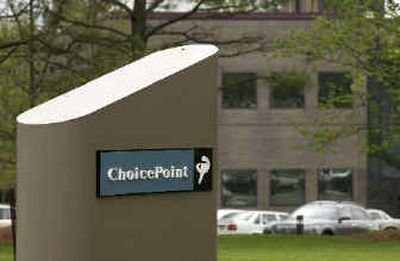Like it or not, data brokers have your number

NEW YORK — Privacy advocates have long complained about scant regulation of the data-brokering companies that traffic in dossiers on almost every adult American.
But barely anyone paid attention.
That’s changing after disclosures by two of the largest such businesses, ChoicePoint Inc. and LexisNexis, that intruders sneaked into the companies’ databases and gained access to dossiers on more than 170,000 Americans, at least 750 of whom had their identities stolen.
The cases, along with word from Bank of America that it lost computer tapes containing data on 1.2 million federal employees, raises the question of what consumers can do to protect their personal information.
The answer: Not much.
Even the most basic report from a company like LexisNexis, which announced this week that dossiers on 32,000 Americans may have been illegally accessed by criminals, includes an individual’s address and Social Security number — enough information for identity thieves to open a credit card account.
Everyone from landlords screening tenants to insurance companies weighing a drivers’ risk to human resources departments wondering if job applicants are ex-felons can buy such data.
Businesses that can see your Social Security number include companies that send unsolicited mail. The Direct Marketing Association says the marketers use Social Security numbers to make sure they’re sending mail to the correct individual.
Journalists can also get that access.
When an Associated Press reporter ordered a LexisNexis report this week, providing her name and address, it came back with her complete Social Security number.
Data brokers compile these reports largely by gathering public records.
“You can’t opt out from all the public records,” said Evan Hendricks, author of “Credit Scores and Credit Reports.” Public information available to the data brokers includes some drivers’ records and property records.
The companies have “opt-out options” to be removed from some databases, said Hendricks, but “you don’t know how to opt out if you’ve never heard of the company before. The current system puts the burden on the individual to discover the system, understand how it works and know what you have to do.”
The largest publicly traded U.S.-based data-brokering companies are Acxiom Corp., which had $1 billion in sales in its 2004 fiscal year and ChoicePoint Inc., which had sales of $795.7 million. (Both made some money from businesses other than selling data — Acxiom had sales of $778.1 million in fiscal 2004 in its services division, which helps companies manage and mine their own data).
Another large data broker, LexisNexis, is owned by London-based Reed Elsevier PLC. Revenues at LexisNexis’ Seisint division, which suffered the security breach, were up 40 percent last year to $120 million, according to Reed Elsevier.
The companies are sometimes called data aggregators because they pull information from a variety of sources and package it in easy-to-digest dossiers.
Acxiom gets data from phone books, directory service, voter registrations, county assessor and recorder information, questionnaires, warranty cards, catalog buyer behavior and product registration, according to its annual report.
ChoicePoint says it has access to more than 19 billion public records, including motor vehicle reports, police reports, license and deed transfers and military records. It has bought companies with databases of bankruptcies, civil judgments and federal and state tax liens. It also bought a company that developed technology to order birth, death, marriage and divorce certificates.
In addition, ChoicePoint has a proprietary database of claims information contributed by insurance underwriters, its annual report says, while the company’s job-applicant screening reports include credit and driving record checks, prior employment verification, education and licensing verification and criminal record searches.
Who wants to know all this?
Acxiom says its clients include Allstate, the city of Chicago, Federated Department Stores, General Electric Co., General Motors Corp. and International Business Machines Corp.
ChoicePoint has more than 50,000 customers including the Federal Bureau of Investigation, the Internal Revenue Service and the Department of Homeland Security.